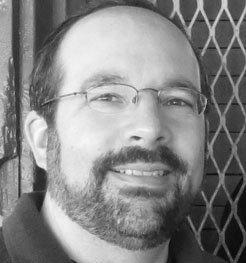Amanda Licastro
Doug Eyman and Collin Brooke, October 8th 6:30-8:30pm
On 25, Sep 2013 | In Uncategorized | By Amanda Licastro
Please join CUNY DHI and the Graduate Center Composition and Rhetoric Community (GCCRC) for a conversation about the intersection of writing studies and digital humanities with Doug Eyman and Collin Brooke. We are excited to welcome these two innovative scholars to share in an important discussion concerning the future of digital rhetoric. Doug Eyman is a professor of digital rhetoric, technical and scientific communication, and professional writing at George Mason University and the senior editor of Kairos: A Journal of Rhetoric, Technology, and Pedagogy; Collin Brooke is a professor of of Rhetoric and Writing at Syracuse University and is the author of Lingua Fracta: Towards of Rhetoric of New Media (complete bios below).
This event will take place on Tuesday, October 8th from 6:30-8:30pm at the Graduate Center, CUNY in Room C415A.
Doug Eyman 
Digital Rhetoric and the Infrastructure of DH
Bio:
Collin Brooke
Too Big to Scale? Culturomics and Crypto-Rhetorics
Since the Google Books Team’s 2010 article in Science and their release of the N-Gram Viewer, the idea of “culturomics” has begun to appear in a variety of academic studies (e.g., Twenge et al.2012, Kesebir & Kesebir 2012, Greenfield 2013). While the resulting claims have garnered attention, both in academic circles and in the popular media, we have spent less time examining the methodological assumptions behind these studies. As a method, culturomics presupposes certain relationships between language and culture; those of us who study rhetoric and digital humanities should be conscious of and prepared to interrogate those assumptions. Drawing on network studies as well as what Hayden White once described as the “tropics of discourse,” this presentation offers both an examination and critique of culturomics as method.

Bio:
Wednesday November 28: “The Commons and Digital Humanities in Museums”
On 07, Nov 2012 | In Meetings, Video | By Amanda Licastro
Wednesday November 28: “The Commons and Digital Humanities in Museums”
Co-Sponsored by the Ph.D. Program in Art History and The Center for the Humanities
Christina DePaolo (Balboa Park Online Collaborative), Michael Edson (Smithsonian), William Noel (University of Pennsylvania), Neal Stimler (Metropolitan Museum of Art)
This event was held from 6:30pm-8:30pm, at the Elebash Recital Hall at the Graduate Center.
The event was free and open to the public, and was livestreaming at cuny.is/live.
The video of the event can be accessed here: http://www.youtube.com/playlist?list=PLRZyktsPhrexW_VDVk1IFoDhZXy9LOyl2
The Storify can be accessed here: http://storify.com/nealstimler/the-commons-and-digital-humanities-in-museums
And images on flickr can be tagged as #cunydhi and accessed here: http://www.flickr.com/groups/cunydhi/
Inspired by the work of Lawrence Lessig, Lewis Hyde and Bill Ivey among others, museum technologists have been striving to provide greater access to cultural heritage collections in the form of a commons. The currents of DIY, digital humanities, free and remix culture have challenged museums to transform their relationships with scholars and the public toward openness and democratic participation. The GLAM-WIKI movement and Creative Commons licenses have also significantly reshaped museum practices. How can museums build vanguard collaborations and collective resources not only to aid constituents as they use institutional content but to create anew in a digital culture? This panel will explore the diverse implications of the formation of commons by museums.
We look forward to seeing you at this exciting session!
Monday November 26: “Digital Publishing Today”
On 07, Nov 2012 | In Meetings, Video | By Amanda Licastro
Monday November 26: “Digital Publishing Today”
Ashley Dawson (CUNY), Matthew K. Gold (CUNY), Michael Mandiberg (CUNY), Tavia Nyong’o (NYU)
Time & Place: 6:30pm-8:30pm, The Skylight Room (9100)
The video of this event can be accessed here:
[vimeo]http://vimeo.com/55566065[/vimeo]
The Commons and Digital Humanities in Museums from The Center for the Humanities on Vimeo.
What are the radical possibilities of open access publishing? This panel will bring together a number of scholars who have published online to consider how university presses are either facilitating or impeding efforts by academics to explore new forms of cultural production and media activism unleashed by movements such as Occupy Wall Street. Join us to explore these questions and to develop new strategies and models for contemporary academic publication.
We look forward to seeing you at this exciting session!



 Welcome to the blog of the CUNY DHI, an effort to build momentum and community around Digital Humanities practitioners at CUNY. We hope you'll join us at our upcoming events and that you'll follow this blog to hear about the latest news in the field.
Welcome to the blog of the CUNY DHI, an effort to build momentum and community around Digital Humanities practitioners at CUNY. We hope you'll join us at our upcoming events and that you'll follow this blog to hear about the latest news in the field.



Recent Comments